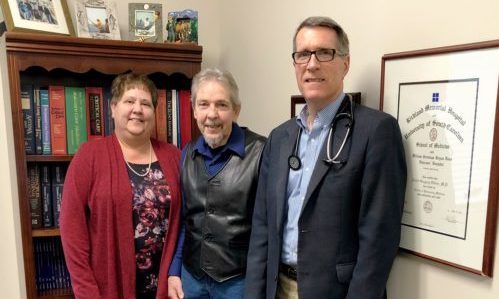Lung Cancer Screening: One Patient’s Story

Harold Marshall, center, is shown with Michele Williams, DNP, and Greg Oliver, MD in Dr. Oliver’s office at UM CMG – Pulmonary Care. Marshall is very glad he underwent the LDCT lung cancer screening and happy to recommend it to other former smokers and current smokers.
Former smoker Harold Marshall got good news this winter– a low dose computed tomography (LDCT) scan at UM Shore Medical Center at Easton revealed no sign of lung cancer.
For Marshall, who had smoked a pack a day for four decades until five years ago, the screening result brought great peace of mind. “I tried to stop several times during my working life, but co-workers who smoked were always offering me a cigarette,” he recalls. “After I retired, I was visiting my grand-daughters who were then just five and six years old, and I heard them talking about how I was smoking in their yard. So I made up my mind to quit and I did, first with the help of smokeless tobacco but eventually I gave up tobacco altogether.”
Marshall had lived most of his life on the Mid Shore but for few years toward the end of his career, was in North Carolina, under a health plan that included a chest x-ray every year. After a few years back in Maryland, the East New Market resident expressed concern to his primary care provider, Eugene Newmier, MD about whether he was due for a chest x-ray given his smoking history.
Dr. Newmier referred him to the UM Shore Regional Health’s new Lung Cancer Screening Program and put him in touch with Michele Williams, DNP, CRNP, oncology nurse practitioner who coordinates the program under the direction of pulmonologist Greg Oliver, MD. Marshall had the LDCT scan at UM Shore Medical Center at Easton, and got a call back from Williams that afternoon. “It was a big relief to know that my lungs are clear and I would not need to go back for year,” says Marshall.
Marshall did learn something about his health from the scan – he has degenerative disk disease in his spine. This was not a surprise to him as he had symptoms, and unfortunately there is no real treatment, but it made him realize that the scan might have incidentally picked up some other health issue that warranted treatment.
“Mr. Marshall’s outcome was not atypical,” says Williams, who has arranged 125 screenings since the program began in July 2017 and personally reviews the scan results with each patient. “About one quarter of patients’ scans have revealed nodules, but about 90 percent of those are not cancer – nodules can be caused by other issues, such as scarring, inflammation or emphysema.”According to Williams, these patients may be referred for a PET scan or scheduled for another CT scan in six months and the LDCT serves a baseline for comparison with future scans. In some cases, the scan has revealed a different issue, for example, a spot on the liver or heart calcifications, and these patients are referred promptly to the appropriate medical specialist.
Most important is that the LDCT scan can detect lung cancer much earlier than a traditional X-ray and well before any symptoms are present. “With early detection, there can be early treatment and ultimately, a much better chance of survival,” says Williams, who also provides support and referrals for smokers who want to quit
LDCT screening requires a provider’s referral, and patients also must meet specific criteria relative to their age and smoking history. For eligible patients, the screening is covered by Medicare and most private insurance. Plans are in the works to expand the LDTC program to UM Shore Medical Center at Chestertown in the spring of 2018.
For more information about LDCT screening, call 410-820-4416
